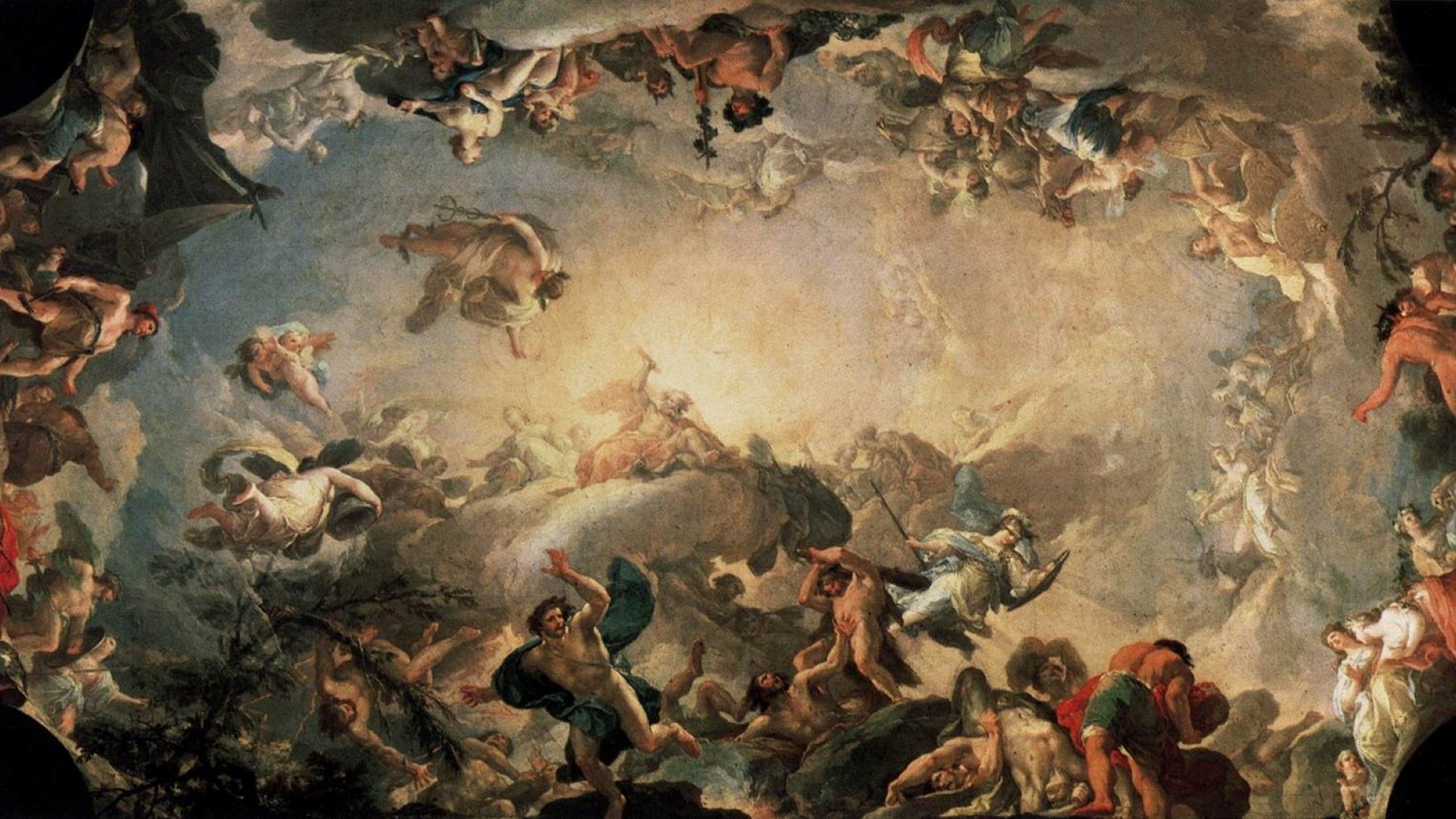
Battle of Thermopylae
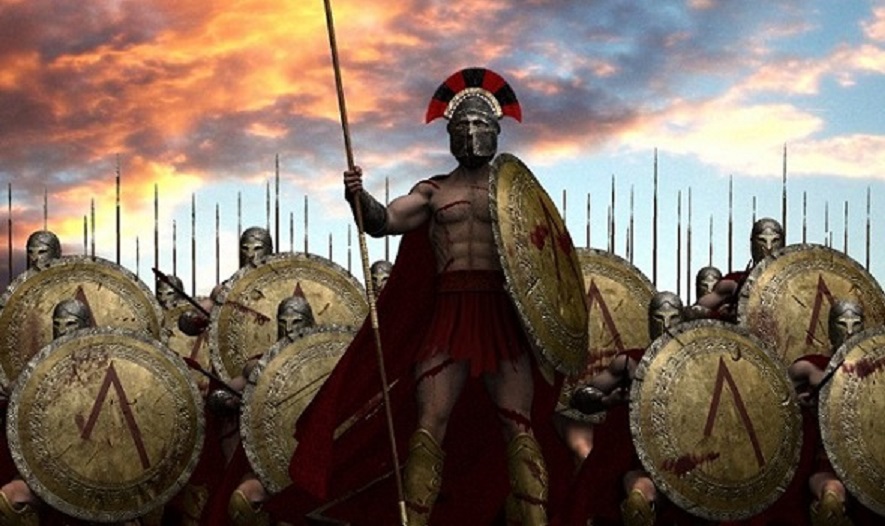
The Battle of Thermopylae - 480 B.C.
In the 5th century bc, the Persian empire fought the city-states of Greece in one of the most profoundly symbolic struggles in history. Their wars would determine the viability of a new direction in Western culture, for even as Greece stood poised to embark on an unprecedented voyage of the mind, Persia threatened to prevent the Hellenes from ever achieving their destiny. Persia represented the old ways - a world of magi and god-kings, where priests stood guard over knowledge and emperors treated even their highest subjects as slaves. The Greeks had cast off their own god-kings and were just beginning to test a limited concept of political freedom, to innovate in art, literature and religion, to develop new ways of thinking, unfettered by priestly tradition. And yet, despite those fundamental differences, the most memorable battle between Greeks and Persians would hinge on less ideological and more universal factors: the personality of a king and the training and courage of an extraordinary band of warriors.
The long path to battle at Thermopylae began in what is now Iran, heart of the once vast Persian empire. Nowadays, ancient ruins attest to its long-vanished greatness, but to the Greeks of the early 5th century bc, the Persian empire was young, aggressive and dangerous. Persian expansion had begun in the mid-6th century, when its first shah, or great king, Cyrus, had led a revolt against the dominant Medes. By 545 bc, Cyrus had extended Persian hegemony to the coast of Asia Minor.
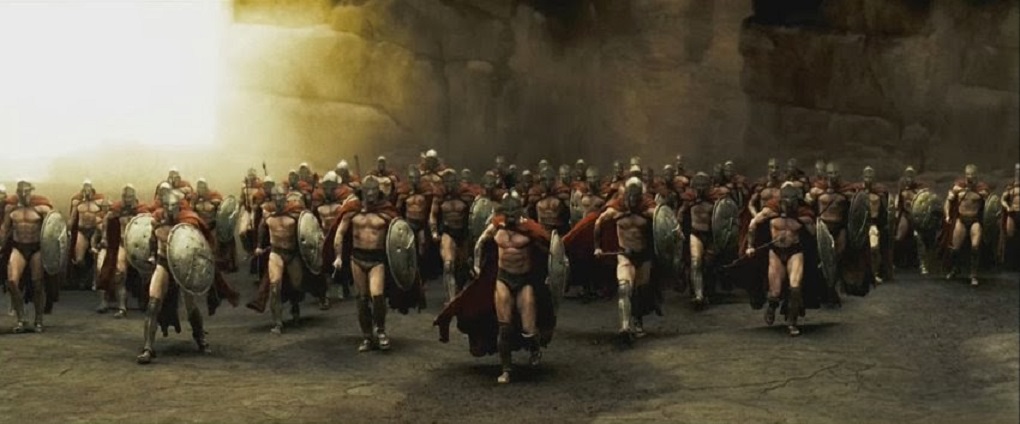
The Greeks of Asia Minor were blessed during their period of subjugation only insofar as the Persian kings generally remained remote figures of power. Stories abounded of executions and tortures ordered on the whims of angry monarchs. One shah's wife reportedly had 14 children buried alive in an attempt to cheat death. There seems to have been little escape from the arbitrary tyranny of the rulers known by the Greeks simply as 'the King or the Great King, enforced by a system of spies who acted as his eyes and ears. Such was the general atmosphere of oppression that one Persian nobleman who failed to do the shah's bidding was forced to eat the flesh of his own son - and upon being shown that he had just done so, could muster no more potent a reply than to say, May the king's will be done.
It was inevitable, then, that there would be tension between the Greek and Persian ways of life, and in 499 bc several Greek cities in Asia Minor revolted against the Persian King Darius. Darius had seized power in 521, when he and six other men crushed a conspiracy of priests on a day that became celebrated on the Persian calendar as Magophonia - The Killing of the Magi. A vengeful man, Darius had ordered that the severed heads of the magi be paraded through the streets on pikes.
According to the Greek historian Herodotus, Darius was especially furious to learn that a distant city called Athens had dared to assist his rebellious subjects in Asia Minor. Grant, O God, he said, shooting an arrow into the air, that I may punish the Athenians. He even commanded one of his servants to interrupt him during every dinner three times to remind him of his goal with the admonition, Master, remember the Athenians. The first Persian War ended badly for Darius, however, when his troops were defeated by a smaller Athenian army at Marathon in 490 bc. Greece was saved - but only for a while.
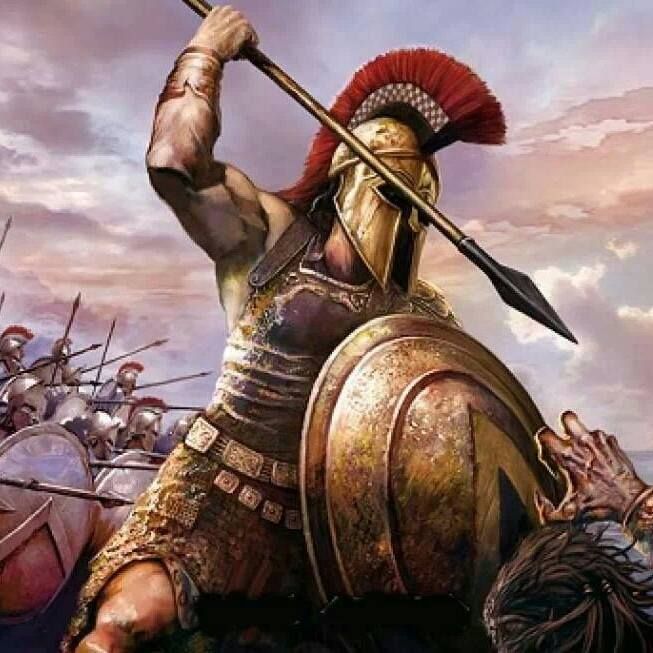
Darius' son Xerxes does not seem to have been especially driven to complete his late father's unfinished business. He waffled over whether the long-delayed punishment of Athens merited such a far-flung campaign. At last a phantom allegedly appeared in his dreams, urging him to invade Greece - this being interpreted by his magi as a portent for world conquest.
Xerxes spent more than four years gathering soldiers and stockpiling supplies from every corner of his empire. The resulting host amounted to a colossal cosmopolitan army of armies. In it were Persians, Medes and Hyrcanians, all wearing felt caps, tunics, mail and trousers, and armed with short spears, light wicker shields and deadly, powerful composite bows. Assyrians joined them, protected by bronze helmets and shields, and bearing spears, daggers and iron-studded wooden clubs. Bactrians, Parthians and Chorasmians added short bows and spears. The Scythian Sacae, in their tall pointed hats, bristled with bows, daggers and battle-axes. Cotton-wearing Indian auxiliaries were armed with bows that shot iron-tipped arrows. There were Paricanians, Pactyans, Arabs, Ethiopians, Libyans, Paphlagonians, Ligyans, Matieni, Mariandynians, Syrians, Phrygians, Lydians, Thracians, Pysidians, Cabalians, Moschians, Tibareni, Macrone and Mossynoeci. The list, even in abbreviated form, reads like a catalog of lost peoples. Together, they formed an army that the Greek historian Herodotus estimated at 1.7 million, excluding the navy. When he added ship-borne fighters and European allies to the total, he came to a sum of 2.6 million, a figure that he reckoned would have to be doubled to account for servants, crews and camp followers.
Herodotus' numbers must surely be overstated, although we will never know by how much. We can only accept that Xerxes' army was a vast and apparently awe-inspiring force - according to Herodotus, whenever it stopped to slake its thirst, it drank entire rivers dry.
Within Xerxes' army, the native Persian contingent was most privileged. Carriages full of women and servants accompanied the Persians on the march. One Persian unit was particularly esteemed: a crack fighting force that Herodotus called the Immortals, alleging that any dead, wounded or sick soldier in its ranks was replaced so swiftly that its 10,000-man strength never seemed to diminish.
Watching his own army pass in review, Xerxes himself is said to have wept as he reflected on the brevity of human life. Not one of them, he observed, would be alive in 100 years' time. It was an unlikely moment of insight for a king who had once ordered one of his own soldiers split in two.
The Persians maintained a splendid marching order. At the front was more than half the army, succeeded by a gap to keep those ordinary troops from being in contact with the king. There followed 1,000 of Persia's finest horsemen, another 1,000 picked spearmen, carrying their spears upside down, 10 sacred horses, a holy chariot drawn by eight horses, then Xerxes' chariot. The king was then followed by 1,000 noble Persian spearmen with their spears pointed upward, another 1,000 picked cavalry, 10,000 infantry, many with gold or silver ornaments on their spears, and finally 10,000 more horsemen before another gap that separated those fine troops from the ordinary soldiers who brought up the rear.
It is entirely possible that Xerxes did not anticipate having to fight any significant battles in Greece. The magnitude of his force was so great that he must have anticipated only demanding surrender in order to receive it. Like his father before him, he sent messengers ahead demanding the traditional tokens of submission - earth and water. Many Greek towns relented in the face of certain destruction. To the Persian king, they conceded, belonged the land and the sea.
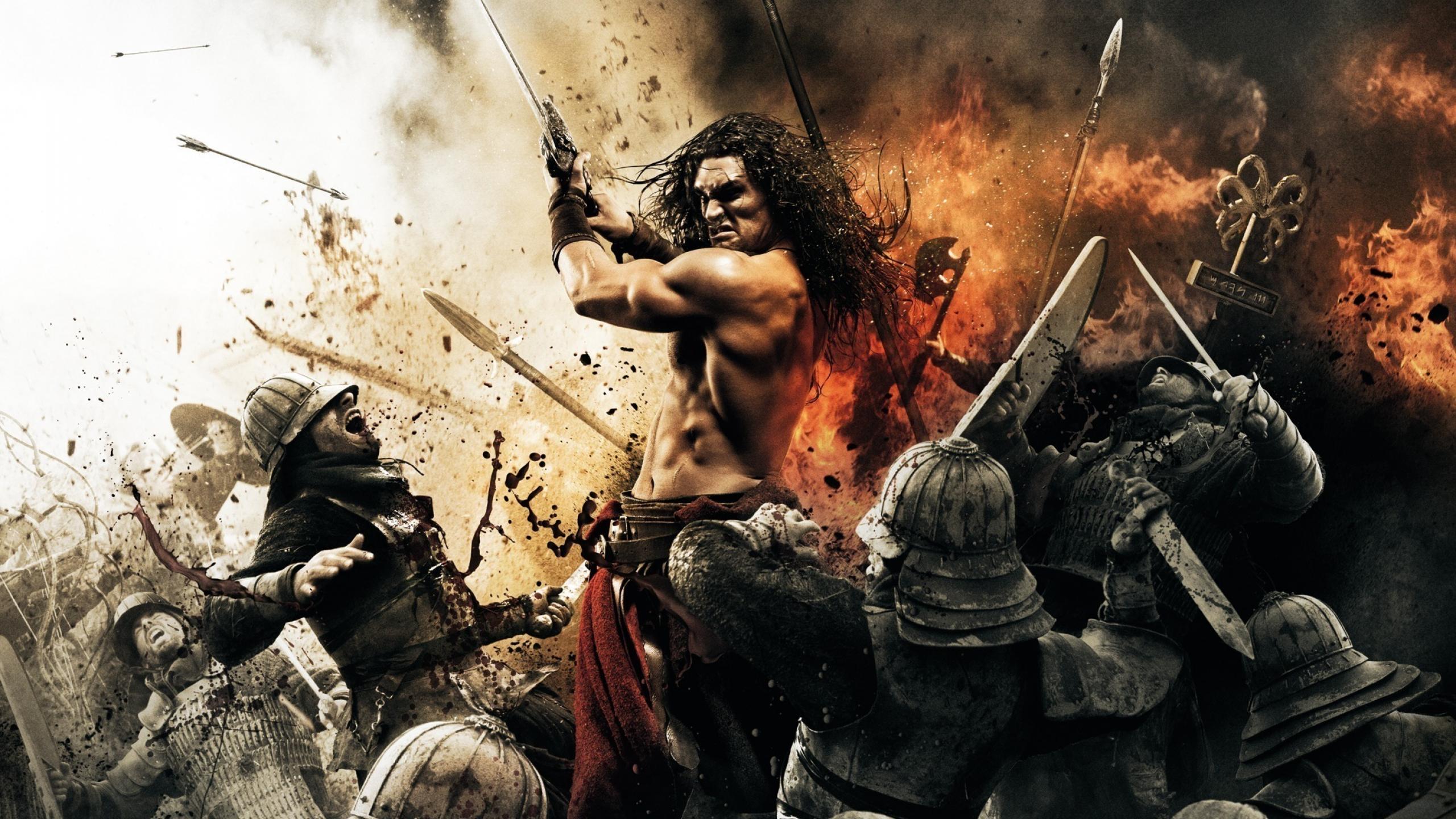
Two cities were spared the indignity of the Persian ultimatum. Xerxes well recalled the fate of the messengers his father had sent to Athens and Sparta. The Athenians had thrown them into a pit. In Sparta the Persian diplomats were shown the place to find the earth and water they sought - by being pushed down a well.
Xerxes was familiar with the willful Athenians who had thwarted his father at Marathon 10 years earlier, but along the march he slowly became acquainted with Greece's other most powerful city-state. At one point he asked a Spartan exile if anyone in Greece would dare resist his force. The exile, for whom there was no love lost for the city that had expelled him, admitted that no length of odds could possibly convince the Spartans to submit. The Spartans, he said, feared only the law, and their law forbade them to retreat in battle. It commanded them to stand firm always and to conquer or die.
Knowing that they could not hope to defeat the Persians as individual cities, the Greeks convened a conference in order to coordinate a Panhellenic defense. It was there that the Spartans, whose own city was unique in that it had no walls (relying instead upon the bravery of its citizens for defense), advocated the construction of a wall across the Isthmus of Corinth, thereby protecting only the southernmost part of Greece. The cities north of Corinth, however, knowing that Xerxes could swing around the Aegean and strike Greece from the north, sought an earlier defense. The congress adopted their strategy. The Greeks elected to draw the line at Thermopylae.
To the Greek strategists in 481 bc, Thermopylae represented their best chance to stop or at least delay the Persian army long enough to allow their combined fleets to draw the Persian navy into a decisive sea battle. A narrow mountain pass, Thermopylae was a bottleneck through which the Persian army somehow had to proceed. Forced to fight there, the Persians would be unable to take advantage of their massive preponderance in numbers; instead, they would have to face the Greeks in close-quarter, hand-to-hand combat.
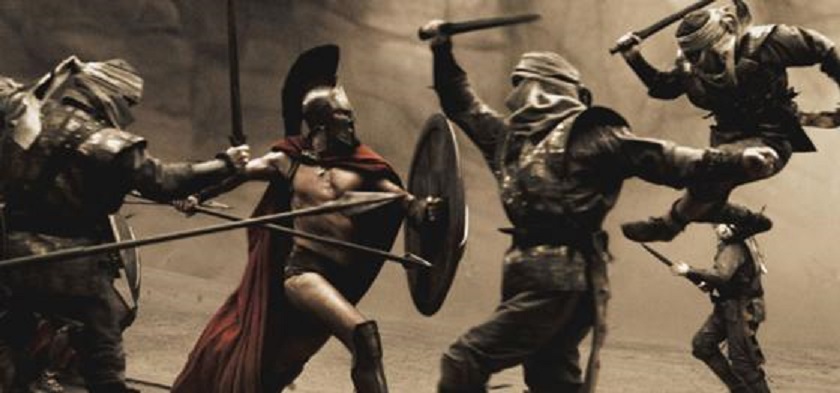
Two armies now prepared to converge on the tiny mountain pass. For Xerxes no force, not even nature, would be allowed to resist his progress. When a violent storm tore up the first bridge his engineers had built across the Hellespont, the great king ordered his engineers put to death, and he had his men whip and curse the waters for defying him. New engineers then bridged the Hellespont again. Constructed from nearly 700 galleys and triremes lashed together, the bridge was a marvel of makeshift military engineering. Flax and papyrus cables held the boats in line, and sides were constructed to keep animals from seeing the water and panicking during their crossing. The Persian army advanced inexorably into Greece.
The Greek force that now raced to Thermopylae was ridiculously small for the challenge that awaited it: 300 Spartans, 80 Myceneans, 500 Tegeans, 700 Thespians and so forth, totaling about 4,900. The countrymen they left behind seem to have put little faith in this army. The Athenians voted to evacuate their city. Their men of military age embarked on ships, while women and children were sent to the safer territory of the Peloponnesus. Only treasurers and priestesses remained behind, charged with guarding the property of the gods on the Acropolis.
If any Greek understood the danger of his assignment, it was almost certainly the Spartan commander, Leonidas. Although each city's contingent had its own leader, Leonidas had been placed in overall command of the Greek army. One of two Spartan kings - Sparta had no kingship in any real sense - Leonidas traced his ancestry back to the demigod Heracles. He had handpicked the 300 warriors under his command; all were middle-aged men with children to leave behind as heirs. He had selected men to die, and done so apparently without the philosophic reluctance of Xerxes. Leonidas and the Spartans had been trained to do their duty, and, having received an oracle that Sparta must either lose a king or see the city destroyed, Leonidas was convinced that his final duty was death.
On the way to Thermopylae, Leonidas sent his widely admired Spartans ahead of the other troops to inspire them with confidence. They arrived to find the pass unoccupied. It was only 50 feet wide and far narrower at some points. There were hot springs there - these gave the pass its name - an altar to Heracles and the remains of an old wall with gates that had fallen into ruin. The Greeks now rushed to rebuild it.
As Xerxes' army drew closer, a Persian scout rode to survey the Greek camp. What he saw astonished him - the Spartans, many of them naked and exercising, the rest calmly combing their hair. It was common practice for the Spartans to fix their hair when they were about to risk their lives, but neither the scout nor his king could comprehend such apparent vanity.
The Greeks, too, began to receive intelligence on the size of the Persian force. Sometime before the battle, the Spartan Dieneces was told that when the Persian archers let loose a volley, their arrows would hide the sun. To Dieneces that was just as well. For if the Persians hide the sun, he said, we shall fight in the shade.Despite the imperturbable courage of Dieneces and the other Spartans, the Greeks were shaken when the Persian host finally neared their position. At a council of war the leaders debated retreat, until Leonidas' opinion prevailed. The Spartan would do his duty. The Greeks would stay put and try to hold off the Persians until reinforcements could arrive.
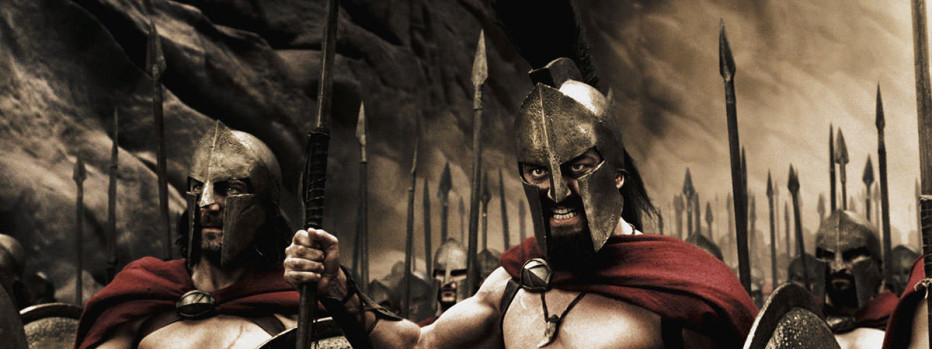
The Persian army encamped on the flat grounds of the town of Trachis, only a short distance from Thermopylae. There, Xerxes stopped his troops for four days, waiting upon the inevitable flight of the overawed Greeks. By the fifth day, August 17, 480 bc, the great king could no longer control his temper. The impudent Greeks were, like the storm at the Hellespont, defying his will. He now sent forward his first wave of troops - Medes and Cissians - with orders to take the Greeks alive.
The Medes and Cissians were repulsed with heavy casualties. Determined to punish the resisters, Xerxes sent in his Immortals. The crack Persian troops advanced confidently, envisioning an easy victory, but they had no more success than the Medes.
What Xerxes had not anticipated was that the Greeks held the tactical advantage at Thermopylae. The tight battlefield nullified the Persians' numerical preponderance, and it also prevented them from fighting the way they had been trained. Persian boys, it was said, were taught only three things: to ride, to tell the truth and to use the bow. There was no place for cavalry at Thermopylae and, even more critical, no place to volley arrows. The Greeks had positioned themselves behind the rebuilt wall. They would have to be rooted out the hard way.
The Persian army was neither trained nor equipped for such close fighting. Its preferred tactic was to volley arrows from a distance, the archers firing from behind the protection of wicker shields planted in the ground. They wore very little armor and carried only daggers and short spears for hand-to-hand combat.
Although students of military history argue that true shock warfare has seldom been practiced - since it is antithetical to the soldier's natural desire for self-preservation - the Greeks had made it their standard tactic. Greek soldiers perhaps drew some confidence from their heavy armor and their long spears, which could outreach the Persian swords. But the Greeks also had another, more intangible, edge: something to fight for. They were defending their homes, and they were doing their duty - they were not fighting as slaves of some half mad god-king. As heavy casualties sapped their soldiers' resolve, the Persian commanders had to resort to lashing them with whips in order to drive them against the determined Greek defenders.
During that long first day of fighting, the Spartans led the Greek resistance. Experienced Spartan warriors would come out from behind the walls, do fierce battle with the Persians, then feign retreat in order to draw the Persians into a trap. Xerxes reportedly leapt to his feet three times in fear for his army.
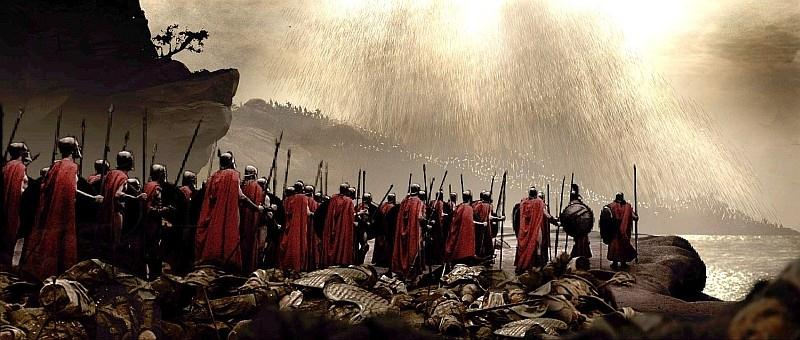
The second day of Thermopylae followed much the same course as the first. The various Greek contingents now took turns fending off the attacks, but the Persians failed to make any headway.
It is difficult to say how long the Greeks could have held off the Persians at Thermopylae - their casualties thus far were comparatively light - but the question was soon made moot. When the Greeks had first arrived, they learned that the presumably impregnable site possessed a hidden weakness: There was a track through the mountains that could be used by an enemy force to surround and annihilate the defenders of the gate. Recognizing the danger, Leonidas had dispatched his Phocian contingent to guard the path. Thus the already small number of troops available at the gate was made smaller still by the division of the Greek forces. The Phocians themselves were charged with the difficult task of defending a route with no natural defenses. Their best hope - Greece's best hope - lay in the mountain track remaining unknown to the Persians.
It was, in the end, a Greek who betrayed that secret. The traitor, Ephialtes, was apparently motivated by greed when he revealed the mountain path to Xerxes. Acting immediately on the new information, the king sent Persian troops up the path during the night, when darkness concealed their movement among the oak trees. Near the top, they completely surprised the luckless Phocians. At last free to fight in their usual fashion, the Persians rained down arrows as the Phocians frantically sought to gather their arms. In desperation, the Phocians raced to higher ground for a last stand. The Persians, however, had no interest in chasing the Phocians higher but instead turned down the trail, aiming for the pass at Thermopylae.
Lookouts raced down the hill to warn Leonidas of the descending Persian army. There was little time left. A quick council of war led to the decision to split up the Greek force. There was no reason for the entire army to be annihilated at the wall. Most contingents were now allowed to return home and prepare for a later showdown. Leonidas and his Spartans, however, would remain at Thermopylae. Standing by them were the loyal Thespians, who considered it an honor to die fighting beside the Spartans. Leonidas also kept as hostages some 400 Thebans whom he suspected of having Persian sympathies.
Although some have questioned the wisdom of Leonidas' decision, wondering if he was overly influenced by a mumbo-jumbo oracle prophesying his sacrificial death, the situation gave him no alternative. If the entire Greek army had fled, it would have eventually been caught from behind and slaughtered by the faster-moving Persian cavalry. Leonidas was giving the retreating troops the only chance they had to escape and fight another day.
It is in many ways the irony of Thermopylae that Sparta, arguably the least free of all the Greek states, now stood as the final defender of Greek freedom. All the things that would make Greece great - science, art, poetry, drama, philosophy - were foreign to Sparta. The Spartans had developed a constitution of almost total subordination of the individual to the community. Spartan elders determined which infants could live or die. Spartan boys were sent into military training at the age of 7. Spartan men lived in barracks, away from their wives, for much of their adult lives. The Spartans ate at a common table, they distributed land equally in an almost communistic fashion and they were forbidden to engage in what were deemed the superfluous arts. Such freedoms as their warrior elite enjoyed did not extend to non-Spartans living in their territory, the Helots, who served as their slaves. Yet the Spartan elite believed passionately in their freedom, and their sense of duty, imbued at an early age, guaranteed that no Spartan commander would ever have to resort to whips to drive his soldiers into battle.
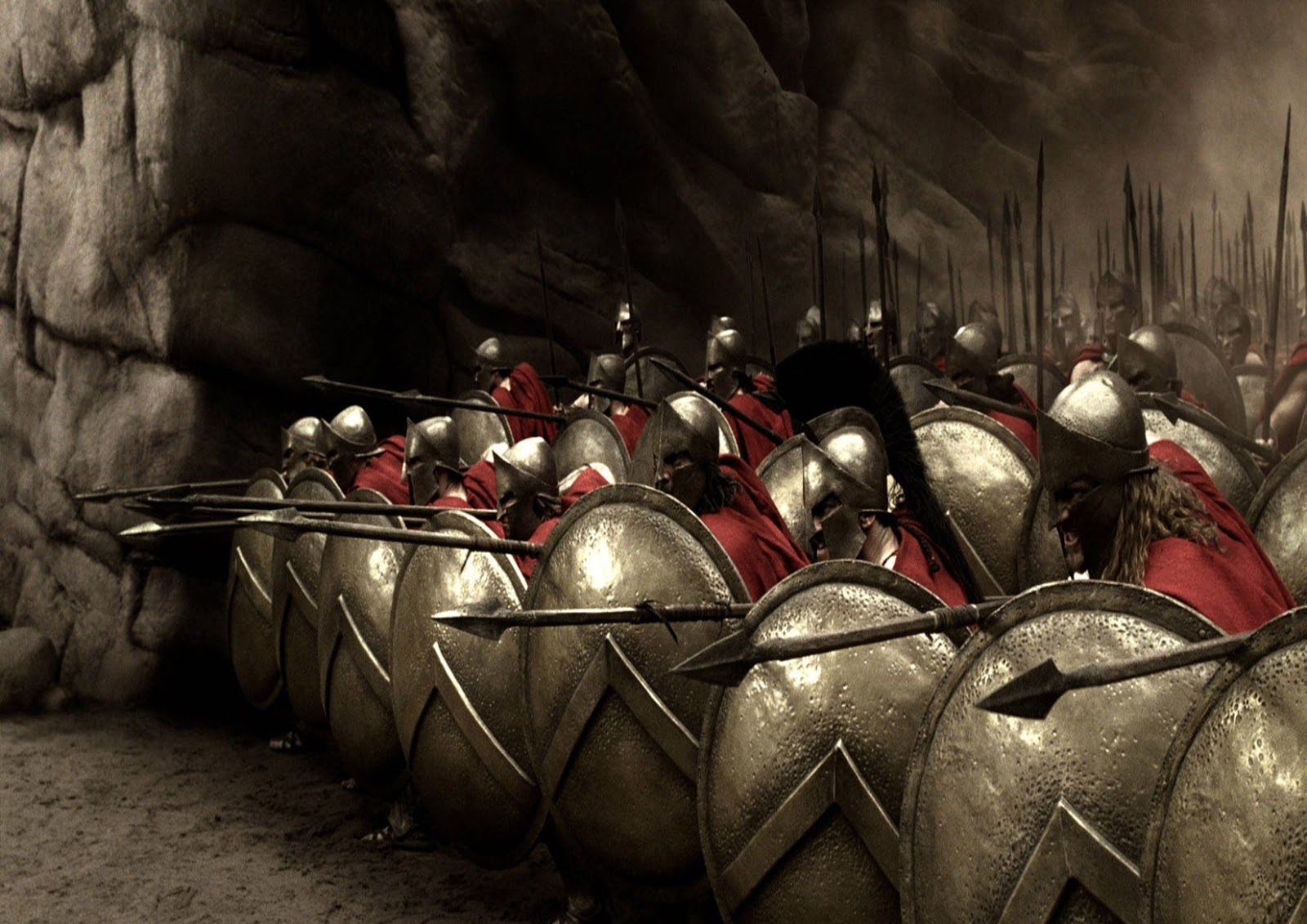
On August 19, the Greeks elected to inflict as much damage as possible on the Persian army. Knowing that this day's struggle would be their last, they pressed stolidly forward, leaving behind the safety of the wall to fight in the widest part of the pass. There, they would battle the massive Persian army on open ground. They would do so, however, without the Thebans, who as Leonidas had expected surrendered to the Persians before the final assault began.
Xerxes ordered his men in for the kill. Once again his commanders lashed their own troops to drive them forward. Many Persians were trampled to death by their own comrades. Others, shoved aside, drowned in the sea. All the while, the Spartans and Thespians did their deadly work. No one, wrote Herodotus, could count the number of the dead.
The Greeks fought with their long spears until the shafts had all broken. Then they fought with swords. In the course of the struggle, Leonidas fulfilled the prophecy that had doomed him. Four times the Greeks then drove the enemy away from his body before the Persians finally succeeded in dragging it away. It was about then that the second Persian force arrived from the mountain pass.
Now completely surrounded, the exhausted Greeks withdrew for the last time behind the wall and formed themselves into a single compact body. Here, wrote Herodotus, they resisted to the last, with their swords, if they had them, and, if not, with their hands and teeth, until the Persians, coming on from the front over the ruins of the wall and closing in from behind, finally overwhelmed them.
The Battle of Thermopylae was over. Leonidas and his 300 Spartans all lay dead, as did the 700 Thespians who had stood by them. The Persian dead were said to number around 20,000, although Xerxes tried to conceal this horrendous loss by having most of them secretly buried, leaving only about 1,000 Persian bodies for his army to see as it marched through the pass.
It was customary in Sparta to make great ceremony over the death of a king. Riders would carry the news throughout the country, and women would go around the capital, beating cauldrons. But Leonidas was denied even a proper burial. Xerxes ordered his head cut off and fixed on a stake. The rest of the Greek dead he ordered buried in order to conceal how few had held up his army for so long, and to remind his veterans of Thermopylae that the Spartans were mortal after all.
The Greeks' courageous stand at the mountain pass had hardly even slowed Xerxes' advance. Four days of waiting and three days of fighting - Leonidas' heroism had bought only one more week for his compatriots. Athens, all but abandoned, was soon sacked.
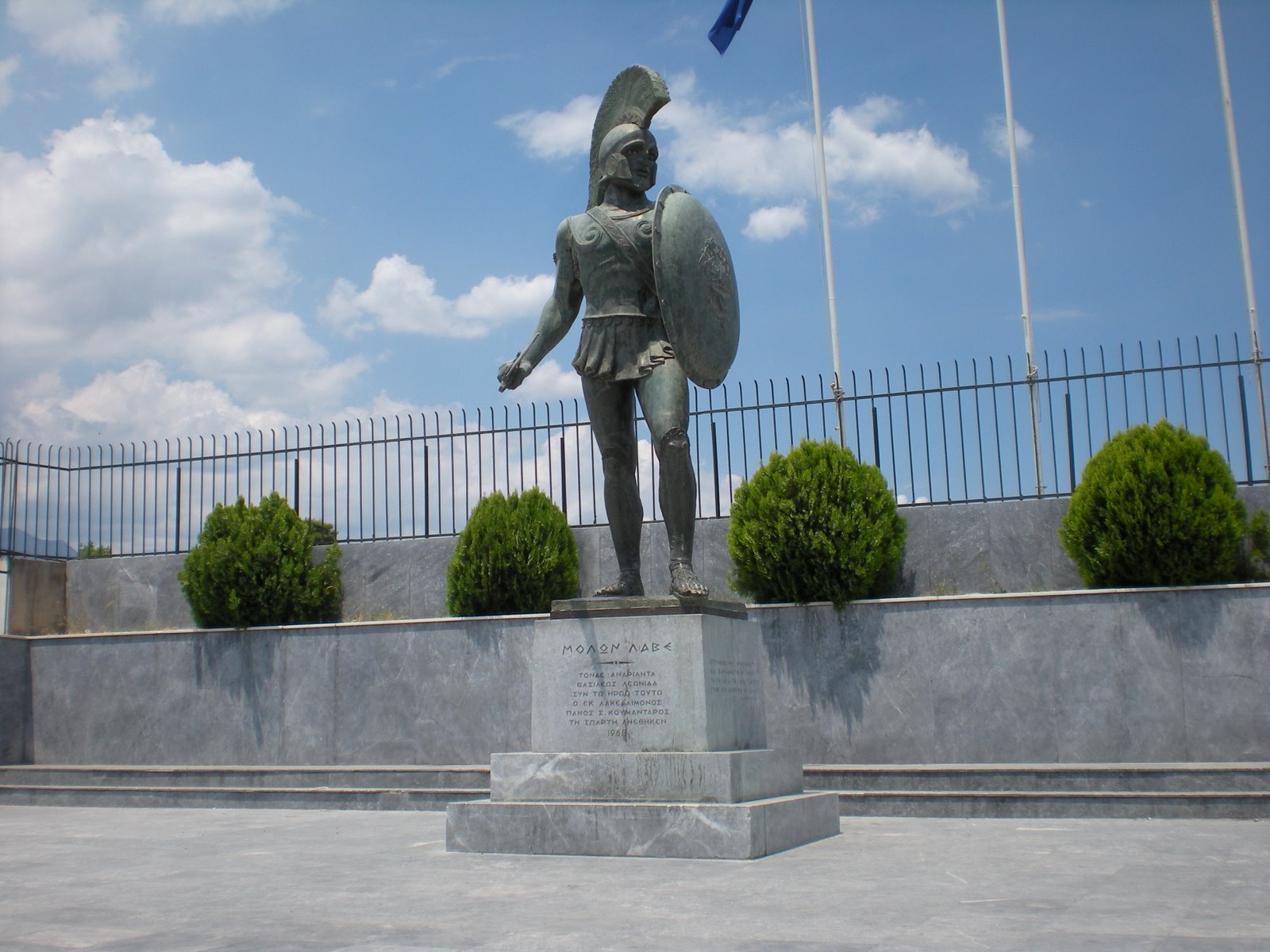
And yet Thermopylae was not a total failure. The invading army had been bloodied - badly, if Herodotus is to be believed - and it must have had some effect on Persian morale. The battle's influence on the Greeks was indisputable. When the war was over - for Greece did finally defeat the Persians - they established holidays commemorating Thermopylae and erected memorials over the battlefield. Four thousand men from Pelops' land/against three million once did stand read one. Another celebrated Leonidas and his 300 men: Go tell the Spartans, stranger passing by/that here, obeying their commands, we lie.
Thermopylae thus acquired a significance that transcended its tangible military impact. In the end, the battle's value lay not in land gained or lost or in men killed or captured, but in inspiration. The Spartans and Thespians had taught Greece and the world an enduring lesson about courage in the face of impossible odds.
Sources
Our Mobile Application
Check out Our Mobile Application "Ancient Greece Reloaded"


